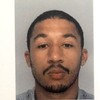The Pueblo Verdolaga tribune, a barra that support Atlético Nacional. Photo: Pueblo Verdolaga fan group
Teenagers play games in a neighbourhood where Pueblo Verdolaga is present. Photo: Pueblo Verdolaga fan group
Juan Esteban giving away Christmas gifts to children from Medellin's poorer neighbourhoods. Photo: Pueblo Verdolaga fan group
An ex-FARC guerrilla member visits the stadium for the first time. Photo: Pueblo Verdolaga fan group
Kids from one of the Pablo Verdolaga social projects. Photo: Pueblo Verdolaga fan group
Pueblo Verdolaga organised a visit to the Casa de la Memoria, Medellin's museum of the Colombian armed conflict. Photo: Pueblo Verdolaga fan group
Photo: Pueblo Verdolaga fan group
A social football match organised by Pueblo Verdolaga and the United Nations to mark the International Day of Peace. Photo: Pueblo Verdolaga fan group
Photo: Pueblo Verdolaga fan group
Photo: Pueblo Verdolaga fan group
Photo: Pueblo Verdolaga fan group
Juan Esteban Mosquera and kids of Medellin. Photo: Pueblo Verdolaga fan group
